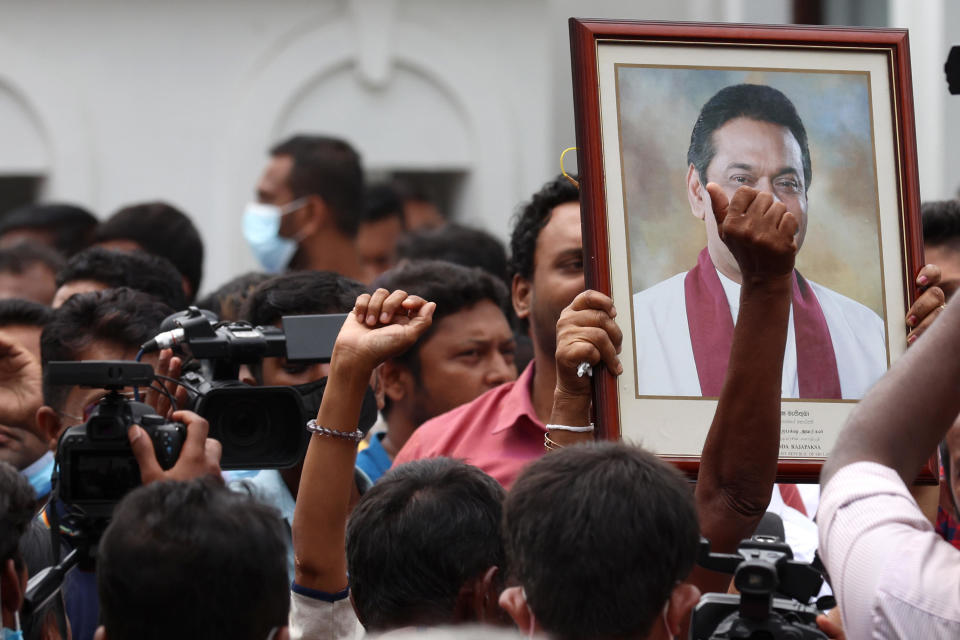Sri Lanka's prime minister resigns as protests turn deadly
- Oops!Something went wrong.Please try again later.
- Oops!Something went wrong.Please try again later.
Sri Lanka's military evacuated outgoing Prime Minister Mahinda Rajapaksa from his official residence in Colombo in an early morning operation on Tuesday, hours after the leader resigned and protesters tried to storm his home.
Rajapaska's evacuation to a secret location followed a day of violent clashes between pro and anti-government protesters in which at least five people — including a lawmaker — were killed, and nearly 200 civilians injured.
Rajapaksa's resignation on Monday followed several weeks of protests against the government's handling of the worst economic crisis that the South Asian island nation is facing in its 74-year-old history as an independent nation.
Price hikes on fuel, food and medicine, coupled with a shortage of those supplies and long power cuts since mid-March have crippled the nation's economy and brought it to the brink of civil unrest and political instability.
The country's capital of Colombo is still facing about four hours of power cuts daily, which could increase to 10 hours of power cuts per day if the government fails to import or acquire fuel by next month.
Rajapaksa tendered his resignation to his younger brother, President Gotabaya Rajapaksa, calling for the formation of an interim government and saying he hoped it would help resolve the crisis.
But the move is not expected to satisfy the anti-government protesters, who have been demanding that both brothers must go.
The Rajapaksa family has dominated the country's politics. Mahinda Rajapaksa, 76, previously served as president for a decade, and prime minister twice. Gotabaya Rajapaksa was elected president in 2019, soon after deadly easter bombings hit the country. He previously served as the country's defense secretary and a controversial intelligence chief accused of human right violations. Two other Rajapaksa brothers have also held cabinet positions.

Sri Lanka has been under curfew and a state of emergency since Friday when the situation started escalating.
On Monday, Rajapaksa's supporters began attacking anti-government protesters who had camped for weeks at three protest sites in Colombo, including outside the offices of the prime minister and the president.
Rajapaksa's supporters pulled down tents of protesters outside the prime minister's Temple Trees residence, and then stormed the nearby "Gota go home" protest site — a reference to Gotabaya Rajapaksa.
The riot control police and military squads fired tear gas and water cannon as the two groups clashed, leading to hundreds being injured.
As Monday night approached, protesters angered by the attack on their protest sites set fire to the personal residence of Rajapaksas in Kurunegala, about 62 miles northeast of capital Colombo. Houses of his several ministers and loyalists were also torched elsewhere in the country.
"Mobs are everywhere… this is an extremely chaotic situation," a Colombo based journalist who did not wish to be named described Tuesday's situation to CBS News.
The mass anger against the government started building months ago as the country grappled with the impacts of the COVID-19 pandemic which almost vanished the country's tourism - one of its biggest foreign currency earners.
But critics and the opposition have blamed Rajapaksas of corruption and economic mismanagement.
Last month, the country defaulted on its $51 billion foreign debt, and last week, finance minister Ali Sabry said they are left with just $50 million of usable foreign reserves. The government has sought a bailout from the International Monetary Fund (IMF), but with the onset of political instability, no one is sure a bailout will occur — which would mean a near catastrophic situation for the country's 22 million people.
Pussy Riot's defiance of Putin's Russia | 60 Minutes Archive
MoneyWatch: President Biden addresses inflation
Preview: CBS Evening News exclusive interview with DEA administrator Anne Milgram

